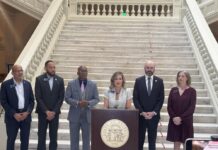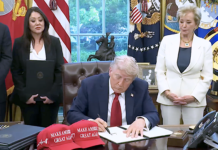
(GA Recorder) — House lawmakers have signed off on the state’s updated $29.9 billion midyear spending plan as state revenues continue to climb.
The budget was approved Friday with a 150-to-4 vote, sending the proposal over to the Senate for consideration.
Notably, lawmakers approved the governor’s plan to send $1.6 billion back to taxpayers who would see between $250 and $500 returned to them this year.
The House-backed spending plan also still includes a $2,000 raise for educators, finishing off the $5,000 pay bump Gov. Brian Kemp promised on the campaign trail in 2018, and it reverses cuts made to education early in the pandemic when revenues initially plummeted.
And House lawmakers are on board with the governor’s plan to give an across-the-board $5,000 pay raise to state workers in hopes of curbing employee turnover.
“This is the first – hear me here – the first cost-of-living adjustment that we as a state have been in the fiscal condition to be able to give to our employees in over 14 years,” said Rep. Terry England, an Auburn Republican and chair of the House budget committee.
“It’s no one’s fault,” he added. “If the economy’s not doing good, we’re not doing good.”
But the uniform approach to the salary increases has also raised questions about how effectively it will retain workers long term.
“Is it not true that what the state really needs is a sustained, serious study of state workforce issues so that, over the long run, we can stay competitive with the private sector and run the state the way it deserves to be run?” said Rep. Josh McLaurin, a Sandy Springs Democrat.
The state economist warned lawmakers earlier this year that the rising revenues that delivered Georgia a record surplus could begin to slow to a “more normal pace” in the coming months.
For now, though, revenues continue to soar. The governor’s office announced last week that January’s tax collections were up 16.7% compared to last year. For the year, revenues are up nearly 18% – or about $2.7 billion.
Those growing revenues have spawned larger state budgets, with Kemp unveiling a $30.2 billion budget that takes effect this July. That’s about $3 billion larger than the current year budget was when it was first approved last year.
Since the governor sets the spending level, lawmakers can only move money around in the budget. But there’s enough leeway for legislators to fund their own priorities.
For example, the budget approved by the House Friday includes $10 million to fund service cancelable loans to Georgia students enrolled in behavioral health degree programs in hopes of bolstering the workforce – a priority of House Speaker David Ralston.
The program is the most expensive element of a behavioral health proposal announced late last month. As proposed, the package would cost about $30 million to fund in next year’s budget, according to the speaker’s office.
“That will be one of those things that it may take us four or five years to see the impact of it, but when we do, we will know it,” England said earlier this week.







